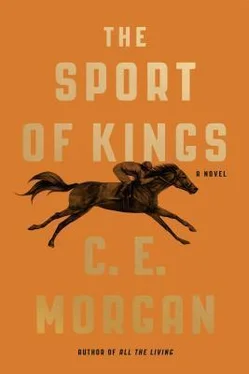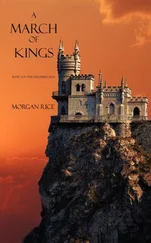* * *
A year ago, there would have been a winter to describe — a palace of ice, hoarse winds that wound white ribbons around the houses with strange gunslinger lightning at Christmas. But this was a new year. The winter was unusually cold. It snowed heavily. That’s all I can tell you.
* * *
In the dark heart of January, Henry was startled awake by a shrilling phone. Mack on the other end, his crude holler of triumph nearly indistinguishable from anger.
“Henry!” he barked. “Henry, we got it!”
Henry worked to draw his mind round. “Got what?”
“Eclipse Award! Two-Year-Old Filly!” The air was charged with his waiting, but when Henry didn’t speak, Mack barreled on. “Awards are in Beverly Hills on January twenty-second. I’ll be coming from Sarasota, so I’ll meet you there. It’ll be at the Wilshire Hotel. They make a damned good old-fashioned.”
Henry cleared his throat. “I won’t be there.”
Now it was Mack’s turn to be silent. He stopped pacing to peer mystified around his office, as though it had vanished before his eyes and he’d suddenly found himself in a bleak and barren wasteland.
“You’re staying home,” he snapped shortly. “You — why?”
“Samuel.”
“Samuel fucking who?”
“Samuel’s having recurrent ear infections and until that’s cleared up, his pediatrician advised that we not fly. He goes where I go. Period.”
Mack tried twice to speak and failed. He tried again. He sounded like a jalopy engine sputtering. “You’re staying home from the Eclipse Awards to take care of a baby?”
“Yes,” said Henry.
There was a silence as beautiful, delicate, and clean as Venetian glass. Then: “Okay!” Mack snapped. “Okay! We’ve worked for this for ten fucking years. Yes. WHAT???” And he flung down his cell phone with such force that the casing snapped and the battery went spinning out his office door like a small satellite careening out of orbit. Stalking to the row, he made a crazed, animalistic sound deep in his throat and grabbed his startled assistant trainer by the lapel so the young man flailed, thinking this was it, this was the moment when Mack would finally haul off and punch him in the fucking throat, but Mack just hollered, “Will someone please tell me where the fucking sane people live?!”
* * *
Which is not what he said into the cavernous ballroom at the Beverly Wilshire Hotel standing before thirteen hundred of the country’s wealthiest and most ambitious horse trainers and owners, circled by the track writers and videographers who recorded it all for posterity.
Mack stood in the glare of the evening’s lights, the whole fancy boondoggle sparkling in its black-tie finery, all those acquisitive eyes focused on him, his Zuni bolo tie suddenly feeling not unlike a noose. God, how he hated this primped-up bullshit, and he’d never forgive Henry for making him puke up a speech on his behalf, but Mack knew that horse better than anyone else, so he guessed he was the only other man for the job. He shifted at the podium, put those red, perma-chapped hands to the hips of his pressed jeans, and said, “Y’all know I’m no speech giver. I don’t care for talk if there’s horses to be trained and races to be run. But, it’s January, there’s nothing going, it’s the Eclipse Awards. I’ll talk for a spell.”
He sniffed hard, looked out at those expectant faces, all of whom had seen the filly run her races and knew what kind of extraordinary thing he was dealing with here. She was more than high-quality stock, more than good legs, more than brass lungs. She was hunger, and you couldn’t buy that.
He said, “I’ve been running horses since I was yay high, and I’ve been training them since I was twenty and a half. Let no man say that I don’t know a great horse when I see one. And by love of God and money, Hellsmouth is a great horse.”
There was rambunctious applause and hollering, but he just talked right over it. “This big black filly isn’t just the best horse I’ve ever trained. She’s the best goddamned racehorse I’ve ever seen. And she’s just getting started.” He paused. “That’s all.”
He stepped off the podium amidst the clapping and not a little eye rolling from those who’d rather have seen him shot than win another purse, and the genuine applause of the men and women he’d made rich. He shook a couple of hands on the way back to his table, where his drinking could be resumed, and he didn’t think, How the hell did some poor Letcher County kid end up here with the brightest and best, but: They ought to pay to eat the dirt under my boots. I turn the mill wheel. Blue-blood silver-spoon trust-fund bastards.
As if on cue, Stu Penderson, a Woodford County acquaintance of some forty years, clapped him abruptly on the back and said, “Where’s that old rascal Henry tonight?”
Mack scowled openly; he didn’t even try to hide his disgust. “You don’t want to know,” is all he said as he tugged loose his bolo tie and returned to his drink to suffer the rest of the banquet alone until he found some lonely desperado who would suffer him in turn.
* * *
I don’t care who you are — a breeder of champions, the scion of scions — a crying baby can bring you to your knees. Henry was snatched from sleep for the third time that night, prisoner to Samuel’s wailing. Nothing in the world could soothe him, not the whirring of a fan, no amount of sweet talk or pacing. He refused the bottle, he struggled righteously against a fresh diaper, he waved his fat arms in fury, and screamed over Henry’s lullabies as if to wake the world with his frustrations.
After an hour of it, Henry was nearly in tears himself, and there was nothing left to try but read from Henrietta’s notebooks, the soft roll of his reading voice serving as a balm, the words a communiqué from another world. Henry arranged Samuel, beet red and squalling, in the valley of his lap, then flipped through the pages. This was a shared habit of their mornings and nights, looking for something he hadn’t yet read. Here was a chart of worms in Kentucky soils, a diagram of the Cincinnati Arch, a quote about the men of Tierra del Fuego killing old women before dogs, because dogs are more useful. Finally, he found a fresh page and read over Samuel’s cries: “Gene Schwartz Jefferson Lecture, transcribed from Penn’s tape.”
The speech was scrawled in excerpts that covered a half dozen pages. Henry transformed the words into a parent’s singsong as he read: “‘I am a farmer and always have been. When I was born, this country supported thirty-two million farmers. My mother used the Farmer’s Almanac to teach me to read, and my father took me out in the fields before I was even able to walk and instructed me properly in the art of plantation. I was educated in the very best sense of the word.
“‘But something has gone amiss in the almost sixty years since I was born. Today, America has only four million farms. That is less than two percent of the population — less than two percent! Can you think of anything less significant than that? Yes, one percent, and it’s coming. We’re on a slippery slope to a postagricultural hell. The how and why of this turn of events is a painful story, and a portentous one if the best predictor of the future is the past.’”
The singsong lilt slipped from Henry’s voice. Samuel was hiccupping his way into calm, listening now with rapt attention, his wide, deep gaze locked on Henry’s face.
“‘… We live in a consumptive world, where we consume more food than we need, where animals are forced to consume our cast-off poisons and the bodies of their own species, where we use more of the world’s resources than is right, where we empower corporations, which consume the lives of their workers with all the blessings of our government, which grants them the same rights and recognitions historically reserved for humans by the Fourteenth Amendment — the amendment designed to guarantee slaves their status as human beings! This, my friends, is consumption. And if you will recall, consumption is an insidious disease, creating for much of its progress the illusion of increased vitality. It promises health, but it delivers death.
Читать дальше
Конец ознакомительного отрывка
Купить книгу












